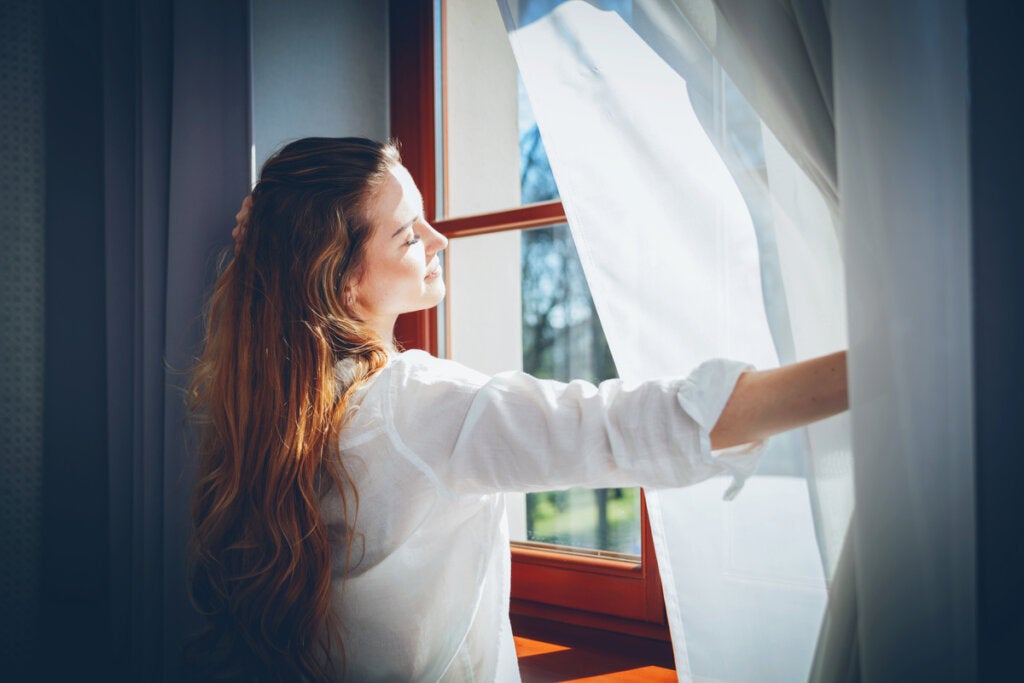What color is the space where you usually work? What kind of light is surrounding you right now? When you need to study, do you worry about the colors around you? Many of us pay little attention to these details, and yet they’re important. Now, science claims that blue light improves cognitive efficiency and acts as a stimulus for the brain.
Blue is the favorite color of the majority of the population. It’s even the most popular in the marketing and advertising industry. It confers harmony, seriousness, trust, tranquility, and even loyalty. However, there’s one even more important aspect: it improves cognitive efficiency.
Indeed, it appears that this spectrum of light can improve the productivity of a work team. It even makes children in classrooms focus their attention better. As Vincent Van Gogh said, it’s almost impossible to get tired of the blue sky. In fact, it certainly seems that we should never stray too far from the shades that nature has given us.
Natural blue light has the greatest impact on our cognitive and emotional well-being.
Blue light improves cognitive efficiency
The favorite color of the art world is blue. Wassily Kandinsky pointed out that it’s the color of abstraction and immateriality. Yves Klein insisted that “blue has no dimensions, it is beyond the dimensions of which other colors partake”. While Matisse commented that “a certain blue enters your soul”.
Indeed, there’s something rather special about this psychological primary color. Perhaps its deep and hypnotic imprint comes from being the main color of our planet Earth.
In fact, in the past, the color blue was so fascinating that humans became obsessed with finding natural pigments to be able to paint and dye clothes in this color. The Egyptians were the first to synthesize the blue pigment.
The preferred study hall at the University of California, Los Angeles (UCLA)
In the newer buildings at the University of California (USA), there’s a small study room that’s the favorite of most students. It’s called The Hedrick Study, also known as the Blue Room. It has comfortable chairs, is spacious, and has high ceilings painted in black, with stars. The particularity is its lighting: a warm and pleasant bluish tone.
All students who spend a few hours there claim that they concentrate far more and that they’re more productive. This data isn’t accidental. In fact, the University of Arizona and Harvard Medical University already pointed out in a study that exposure to blue light enhances cognitive performance. In addition, data retention is better, as well as focus.
This is due to the system of photoreceptors in the brain related to the circadian rhythms. The color blue is associated with daytime, sunlight, and brightness. Hence, the brain is activated and optimizes its resources, as well as its potential. More specifically, it facilitates working memory.
As a matter of fact, this type of light spectrum enhances everything from understanding and reasoning to planning and problem-solving. That’s because the brain associates blue with daytime activity and with the need for us to respond and act in our surroundings when it’s daylight.
Blue light inhibits melatonin production. Therefore, when it gets dark, it’s important not to come into contact with devices or lights of this color. Otherwise, you’ll have trouble falling asleep.

Blue light and our biological sensitivity to this wavelength
The sky, the oceans… Blue light is present on the canvas of nature and is the tone that, from afar, distinguishes our planet. Carl Sagan pointed this out in his book, Pale Blue Dot, (1994). As humans, we continue to be intimately linked to these kinds of scenarios, to the origins that gave us life, sustenance, and well-being.
A study conducted by the University of Exeter (UK) claimed that blue light improves mental health and reduces rates of depression. The study further suggested that coming into contact with ‘blue spaces’, (those close to water) favors mental balance, vitality, and even hope.
In these situations, the brain becomes activated, focuses much better, and enters a highly enriching state of positivity and receptivity. In fact, as a general rule, dispensing with natural light makes us sick. That’s why the possibility of artificially recreating blue light in our work and study centers is now being considered. It’s thought that this would make us more active and even more productive.
Nevertheless, there’s one condition. Blue light is only beneficial in the central hours of the day. At sunset, we must respect our circadian rhythms and dispense with all light stimulation, especially artificial ones. Indeed, our well-being always involves living in harmony with nature and its cycles. That’s the key.
The post Science Claims That Blue Light Improves Cognitive Efficiency appeared first on Exploring your mind.



















Comments